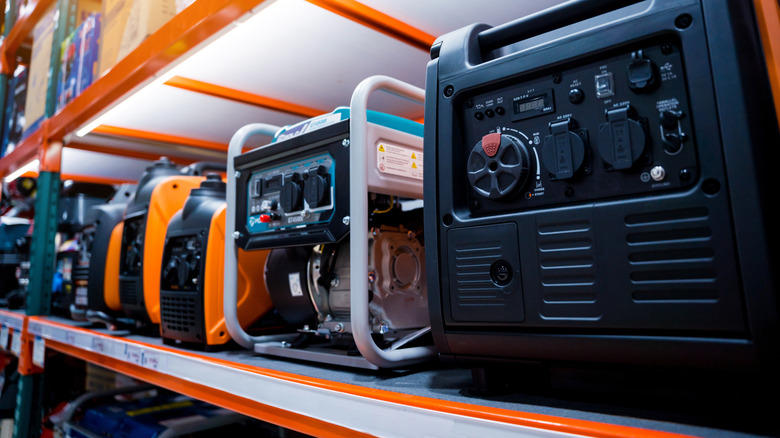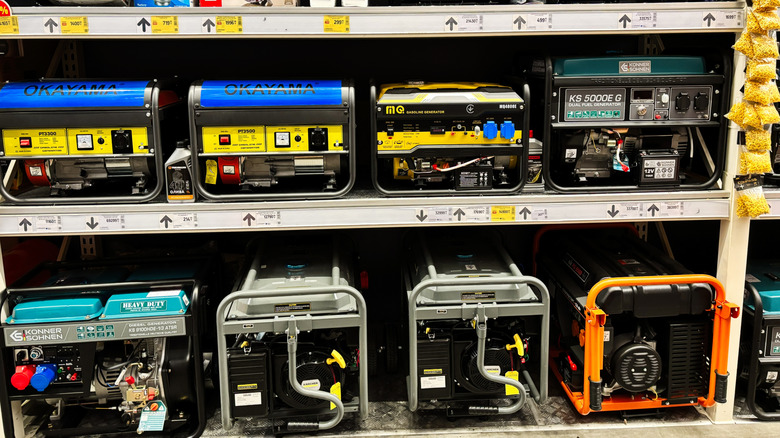Gasoline Vs. Propane Generators: Which Is The Cheaper Option?
With its ability to provide power during outages, while outdoors, or during emergencies, a generator is a great backup device to have at home. Capable of supplying uninterrupted electricity to power lighting, tools, and other essentials, generators are vital for houses, offices, businesses, and for public service facilities like hospitals and police stations. There are several different types of generators, which is why it's important to understand what factors should be considered when buying one. Among the most popular kinds are the gasoline and propane variants, with gasoline-powered generators being cheaper.
Gas-fueled generators are the most common type used in homes and businesses, and are available in different capacities ranging from a small 1,000W unit to a massive 18,000W industrial-grade power supply. Comprised of three main sections — the fuel tank, the engine, and the alternator – gensets produce power through the conversion of the engine's mechanical energy to electricity. Essentially, the genset engine works similarly to the engines installed in vehicles, but instead of powering wheels, it runs the alternator, which causes a powerful magnetic field that is turned into electricity.
Gasoline generators are sold at various price points. For example, you can expect to pay around $300 for a 2,500W model, up to over $1,000 for a 9,200W higher-end one. In terms of operating costs, the fuel consumption of gasoline generators will vary depending on their power rating, size, and load usage, which can average between half a gallon an hour for a 2,000W version and three gallons an hour for the more powerful 10,000W units. Additionally, as it's easy to obtain its fuel from any corner gas station, gasoline generators are easy to own and operate.
Cost and long term usability
An alternative to gasoline generators is a propane generator. You can also find dual- or tri-fuel types, which can use propane, gasoline, or natural gas as their power source. While functioning identically to gasoline generators, propane and dual- or tri-fuel generators are more complex due to the additional components to utilize propane, which is a gas, and other fuels. Made to easily switch between fuel modes by simply connecting the new fuel source and pressing a switch, its versatility, however, comes at a cost, as propane or dual-fuel generators are more expensive, starting from $300 to $600 for a 2,450W variant to as much as $1,300 for a dual-fuel 9,000W, and even more for the tri-fuel version.
Aside from the cost, each type of generator has its own advantages, which is why both are some of the most sought-after models of portable generators. Gasoline units are more portable, due to their smaller size and weight, have easier maintenance requirements, and can operate for longer periods. Propane generators, on the other hand, are more environmentally friendly, and their fuel has a longer expiration period and is easier to procure during emergencies. Dual or tri-fuel types offer the most flexibility, by being able to operate on different fuels, allowing for longer usage than conventionally powered generators.
Alongside its advantages, it is crucial to note the individual drawbacks of each type to determine which works best for a specific use case. Gasoline generators produce more emissions, consume more fuel, and generate considerably more heat when they're used. Propane-based generators, meanwhile, are less durable, require transport, and have bulky tanks for their fuel. Lastly, dual- or tri-fuel generators are more difficult to operate, need additional storage for their different fuels, and require specific knowledge, like avoiding mistakes when using generators, and skills for their maintenance and repair.

